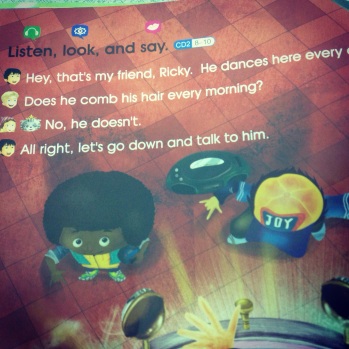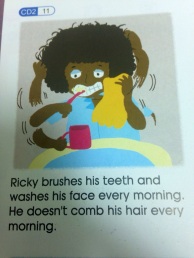I’ve written about some of the issues Taiwan has related to race and ESL eduction and I try to carry the flag in bringing awareness to this problem here in Kaohsiung, but alas there is still work to be done.
I recently came across this in one of the textbooks I teach out of:
In this particular book the characters are visiting New York and apparently saw fit to visit the Bronx where you can see black kids with afros and cornrows break dancing in the street, every afternoon.
What was probably a guileless attempt by the school (one of the larger chain schools in Taiwan that publishes it’s own curriculum) at introducing students to different English speaking cultures (in this case, black American culture?), comes off as uneducated and offensive. I’m surprised that a company so obsessed with providing a well rounded learning experience could be so off base. This is a wholesale buy-in of the shitty American stereotypes that have made their way across the ocean and found new homes within the Taiwanese global psyche.
I stare at the pages in disbelief before thinking about how I can skip over this part of the dialogue, but the dialogue is an extension of the grammar pattern to be taught in the next section and will need to be memorized and recited. The kids will learn it whether I teach it or not.
I decide to have a quick conversation about what’s on the page. This is a class of eight to ten year-olds so I try to make it as simple as possible. I explain to them that despite what their book says, “Ricky” needs to comb his hair every morning just like they do. This is difficult for them to understand because they know Teacher Jay doesn’t comb his hair and as far as they’re concerned Teacher Jay is the same as Ricky: black and with hair different from their own. For my students there’s nothing separating blacks from other blacks (regardless of where their respective countries); just blacks from Taiwanese. So not combing ones hair becomes a defining feature of all black foreigners. This mistruth is then used to stress the grammar pattern being taught in the textbook:
Does Ricky comb his hair every morning?
No, he doesn’t
Does he dance every afternoon?
Yes, he does.
I see this and immediately think of the experiences I had on arrival while searching for a teaching job. Wrestling with the widely accepted view that blackness is this weird otherness that cannot survive outside of only being “the other.” There’s little difference between this and my difficulties finding teaching work the first few months on the island. In both situations, blanket stereotypes left unchecked have become the common truths from which to hang opinions. The end result is that people are only able to relate with those perceived as “other” through differences instead of through similarities, and in Taiwan, difference is sometimes met with adversity. Inserting these stereotypes into an ESL textbook is dangerous in that they become perpetual, further strengthening faux truths for Taiwanese students about people who are different from them.
In arguments conversations with other expats on forums and in person, I’ve fielded the opinion (multiple times) that nothing can be done about this; that there’s no use in trying to change local opinion; that foreigners have it good in Taiwan and I shouldn’t complain. That because most schools are only concerned with maintaining a revolving crop of eager English learners (i.e. maintaing a steady cash flow) they’re reluctant to change anything and reasonable complaints unnecessarily stir the pot.
Fuck that. When I open up a textbook and see something like this,
I’m more inclined to curse someone out than reluctantly dismiss it as acceptable. I find it hard to believe I’m the only foreign teacher who’s seen this and thought it inappropriate, but it’d be easy to assume that few (if any) teachers actually voiced opinions about it.
That being said, I still believe the best attempt at combatting these hiccups in intercultural understanding is through added exposure to the cultural facets of foreigners in Taiwan–instead of only the language (that the two are often separated is odd to me). Most of this shit comes from western cultural texts so I feel we shoulder some of the responsibility to help sift through the bullshit. Talk with students and coworkers about why it’s not acceptable to snicker or make snide comments about different types of foreigners, but also take the time to highlight cultural similarities when opportunities present themselves. If there’s an opinion or idea expressed that is based on a cultural untruth, set it straight instead of waiting until later to bring it up when you’re safely entrenched among other expats.
A little cultural respect goes a long way. We can start by speaking out and having more of it for ourselves.



I think it is a similar situation here in Thailand too, going on some of my friends’ experiences. When it comes to race here you are either ‘Thai’ or ‘foreign’ and then within ‘foreign’ you are ‘white’ (and instantly heralded as superior in beauty and life prospects) or ‘black’ (and instantly misjudged because of it). We see a lot of black people coming over from S Africa who can only get substitute work at schools. I’ve seen a mixed race girl told she needs to get lighter or darker, not be in between. Why? Could they not judge her with ease? It’s a joke when complete idiots can get a job teaching based on the colour of their skin.
The notion that whiter is better runs rampant in Asia. In many countries they’ve let their cultural notions of beauty become the determining factor in what makes a good teacher. The result–as you mentioned–is individuals with very few skills in the classroom getting hired over quality teachers simply because they look the part. It happens in Taiwan as well. It’s particularly surprising to hear this type of thing happening in Thailand where I would assume that attitudes toward darker skin are more progressive given that Thais are some of the darkest people in SE Asia. You learn something everyday. Thanks for the comment.
Hello, I’m sorry that you are dealing with these issues on race in Taiwan, however, I would like to know how acceptable dreadlocks are on a white person there? I’m asking you because I stumbled upon your blog while trying to research on Google it’s acceptability in Asia, but I can only find personal blogs that don’t actually divulge that specific information about white people and I saw that you work in Taiwan. I am about to finish up my program and would like to start teaching this fall, but I was wondering if dreadlocks are met with discrimination there. Any information you have would be very very helpful ! ~
Sorry for the late reply, Jessie. This somehow slipped past me. Whites with dreds? I couldn’t say for sure how the Taiwanese feel about caucasian dreadlocks, but my guess is that as long as it’s well kept, you probably be okay. I’ve heard stories about people being asked to cut their hair before accepting job offers, but I don’t think it’s common practice.
I wholeheartedly agree! A really, really important point made here about racial stereotypes in Taiwan, which I would say extends to China as well (I’ve taught in both countries and in fact, I recognize your book!). Oh man…how many times have I had this uncomfortable conversation and felt like I was talking to a brick wall…one of my middle school students told me point-blank she “doesn’t like black people.” From the mouths of babes! Most foreign teachers don’t even challenge these alarming stereotypes (either because the students will complain or because it’s too hard). I did entire lessons on stereotypes and the students did not thank me for it! I admire your persistence and this piece of writing which I hope more teachers will read.
Thanks for the comment. I have heard from teachers and travelers that it is a similar situation in China. Stereotypes based on a lack of exposure to other ethnic groups lead to some pretty ignorant situations. It’s an uphill battle for sure, but I’m not the one to sit idly by and accept the common belief that nothing can be done about it. My hope is that visitors to Asian countries that harbor these type of views speak up early and often when they witness or hear cultural untruths–regardless of their ethnicity.